Monthly Archives: January 2016
Cerebus re-read 2015–2016: Jaka’s Story
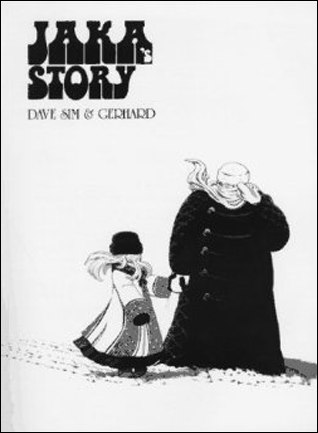 I’ve been looking forward to this one big-time. The main reason I love Cerebus is that its scope is so huge. The focus (and sometimes the lack of it) and dedication of Dave and Ger is astounding, and the source of much of my admiration for them. I’ve always been into “big” projects. Even if they aren’t entirely successful, I still highly appreciate the guts that it took to produce the thing. I sometimes think of this series as the Sandinista! of comics. Warts & all.
I’ve been looking forward to this one big-time. The main reason I love Cerebus is that its scope is so huge. The focus (and sometimes the lack of it) and dedication of Dave and Ger is astounding, and the source of much of my admiration for them. I’ve always been into “big” projects. Even if they aren’t entirely successful, I still highly appreciate the guts that it took to produce the thing. I sometimes think of this series as the Sandinista! of comics. Warts & all.
It’s quite interesting, then, that in addition to crafting something so admirably gargantuan, this creative team also pulled off one of the greatest single volume graphic novels of all time (and my personal favorite, overall). Now, technically, it’s not quite a stand-alone, because it helps to understand why there’s a furry grey creature running around in a very small mountainside community…but it’s not essential to have that knowledge, and I think that one can enjoy Jaka’s Story as a single volume easier than they can High Society. This is helped by a very small cast of almost unknowns, the single setting (made up of three different buildings), and the fact that Cerebus doesn’t have much to do in the book aside from observe and maybe have ONE ale at the pub.
I’ve also been looking forward to this one because I don’t have to write as much of a detailed plot description. The nature of the writing is such that the story is a lot more about the relationships between the characters than it is about a chronology of events. It’s kind of like the kitchen sink drama of comics. Or the Kitchener sink drama. HAR!
After Cerebus returns from the moon, he begins walking down the Black Tower, probably feeling a little aimless (he’s going to “…die alone. Unmourned. And unloved,” remember?). He stops by a tavern positioned near some small cottages, and tries to pay the barman for ale with the single gold coin he has left. The barman basically flips out and tells Cerebus that he can’t possibly accept it. We find out a little later that after the Cirinists took over Iest and all of Cerebus’ gold, that its value has gone through the roof. While Cerebus is in the tavern, Jaka unexpectedly walks in. The two share a touching reunion, and it’s eventually decided that Cerebus will stay with Jaka and her husband, Rick Nash, for a time. It’s just the two of them, as Jaka reveals that she had a miscarriage, so the child she told Cerebus about in Church & State was never born. While living with the Nashes, most of Cerebus’ time is spent on an emotional rollercoaster every time the couple have an argument. He told Jaka that he would not be leaving without her, now that he has no responsibilities, and Jaka does not have a baby. Jaka shuts him down handily, but Cerebus is a stubborn one and also, doesn’t have anywhere else to go. Why not stick around and be tortured by seeing his unattainable love every day?
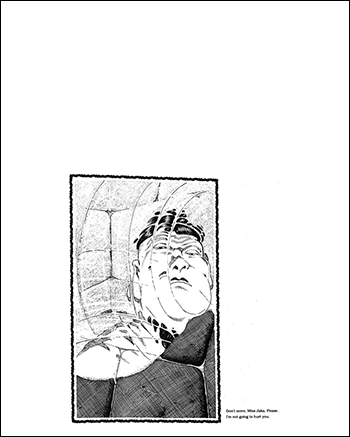 Rick turns out to be a lanky slugabed, albeit an unbelievable good-natured one. His outlook on life is unfailingly positive, and he is kind to all. However, he is beginning to feel neglected by Jaka, who quite understandably feels she has had to take on all the responsibility for their financial security. She is often cold, distant, and impatient with Rick, who makes periodic efforts to find a job, with no results. The barman that refused Cerebus’ gold is Pud Withers, who inherited from his mother the small plot of land upon which his bar and the two other cottages sit. The monetary advantage of his arrangement with Jaka is a little perplexing at the beginning: Jaka visits his shop every morning, refers to him as “Mr. Withers,” exchanges formal pleasantries, and pays him three copper bits for various fruits and nuts (which, more often than not, are out of season or rare). In the evenings, Jaka is employed as a dancer (her one passion) at his tavern, where she calls him “Pud,” and they have a much more casual relationship. As the tavern is secluded on the side of the Black Tower, they’ve been without customers since Jaka and Rick moved in. Regardless, Pud pays Jaka three copper bits (!) for her services, and the cycle repeats the next day. It’s obvious that Pud has the major hots for Jaka, and it’s revealed in some fairly dark conversations that he constantly rehearses in his mind that at a certain point, he’s going to find a way to get what he wants.
Rick turns out to be a lanky slugabed, albeit an unbelievable good-natured one. His outlook on life is unfailingly positive, and he is kind to all. However, he is beginning to feel neglected by Jaka, who quite understandably feels she has had to take on all the responsibility for their financial security. She is often cold, distant, and impatient with Rick, who makes periodic efforts to find a job, with no results. The barman that refused Cerebus’ gold is Pud Withers, who inherited from his mother the small plot of land upon which his bar and the two other cottages sit. The monetary advantage of his arrangement with Jaka is a little perplexing at the beginning: Jaka visits his shop every morning, refers to him as “Mr. Withers,” exchanges formal pleasantries, and pays him three copper bits for various fruits and nuts (which, more often than not, are out of season or rare). In the evenings, Jaka is employed as a dancer (her one passion) at his tavern, where she calls him “Pud,” and they have a much more casual relationship. As the tavern is secluded on the side of the Black Tower, they’ve been without customers since Jaka and Rick moved in. Regardless, Pud pays Jaka three copper bits (!) for her services, and the cycle repeats the next day. It’s obvious that Pud has the major hots for Jaka, and it’s revealed in some fairly dark conversations that he constantly rehearses in his mind that at a certain point, he’s going to find a way to get what he wants.
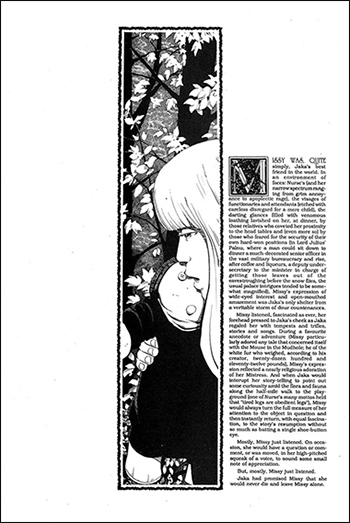 The comic relief is supplied by the Nashes’ neighbor, Oscar. Charming, arrogant, and Wildean as his namesake, Oscar is a writer who rented his cottage from Pud’s mother when she was still alive. He periodically travels to Upper Iest to visit his publisher and appear at various social gatherings. Rick is constantly bowled over by Oscar’s stories, and Oscar derives great enjoyment from spending time with Rick, as well. Jaka and Pud, on the other hand, highly dislike his pomposity. Oscar returns the animosity toward Pud, but what only Rick knows is that Oscar’s newest work-in-progress is the story of Jaka’s youth, which Rick has been feeding him information on. “Jaka’s Story” the book appears throughout Jaka’s Story the graphic novel, in the form of columns of prose accompanied by a single image every few pages or so. It’s a fantastically effective and engaging way to bridge the gap between Jaka’s early years in Palnu and her current life in Iest, although as a writer, Oscar has had to pad out the story with some speculation. The only problem is that Oscar is having difficulty describing Jaka’s dancing. Having never seen her dance, he finds himself lacking in inspiration. He is eventually able to view her art in the tavern, as a newly-arrived customer has given Jaka the opportunity to dance. Oscar is captivated by her movement, and is sufficiently motivated to reveal that he would like to read from his new book, “Jaka’s Story,” which Jaka freaks out about. While he is at his house picking up his book, the tavern is descended upon by a cadre of Cirinists, who kill Pud and the random customer, and nearly do the same to Rick and Jaka until she evokes diplomatic immunity as Lord Julius’ niece. The two are carted off. Oscar arrives and is sentenced to two years hard labor for working as an author with no license. Cerebus, having gone to the lower city to obtain some paint, returns to find the mini-village ransacked and empty.
The comic relief is supplied by the Nashes’ neighbor, Oscar. Charming, arrogant, and Wildean as his namesake, Oscar is a writer who rented his cottage from Pud’s mother when she was still alive. He periodically travels to Upper Iest to visit his publisher and appear at various social gatherings. Rick is constantly bowled over by Oscar’s stories, and Oscar derives great enjoyment from spending time with Rick, as well. Jaka and Pud, on the other hand, highly dislike his pomposity. Oscar returns the animosity toward Pud, but what only Rick knows is that Oscar’s newest work-in-progress is the story of Jaka’s youth, which Rick has been feeding him information on. “Jaka’s Story” the book appears throughout Jaka’s Story the graphic novel, in the form of columns of prose accompanied by a single image every few pages or so. It’s a fantastically effective and engaging way to bridge the gap between Jaka’s early years in Palnu and her current life in Iest, although as a writer, Oscar has had to pad out the story with some speculation. The only problem is that Oscar is having difficulty describing Jaka’s dancing. Having never seen her dance, he finds himself lacking in inspiration. He is eventually able to view her art in the tavern, as a newly-arrived customer has given Jaka the opportunity to dance. Oscar is captivated by her movement, and is sufficiently motivated to reveal that he would like to read from his new book, “Jaka’s Story,” which Jaka freaks out about. While he is at his house picking up his book, the tavern is descended upon by a cadre of Cirinists, who kill Pud and the random customer, and nearly do the same to Rick and Jaka until she evokes diplomatic immunity as Lord Julius’ niece. The two are carted off. Oscar arrives and is sentenced to two years hard labor for working as an author with no license. Cerebus, having gone to the lower city to obtain some paint, returns to find the mini-village ransacked and empty.
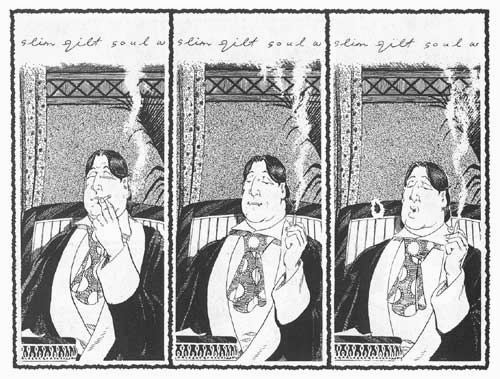
Jaka is held in a cell for a time, then released into a room more befitting her diplomatic status, where she is interviewed daily by a Mrs. Thatcher (you can guess the parody this time), who is a revoltingly condescending Cirinist of high ranking. She tries to pressure Jaka into admitting that dancing for men is WRONG, and that it causes lewd thoughts in their minds. She presents a newly shaven Rick, and proceeds to tell him that Jaka had actually aborted their child rather than having had a miscarriage. He becomes enraged when he finds it was to have been a boy, strikes Jaka and declares emphatically that he never wants to see her again. The two are separated, Rick to his mother’s, and Jaka back to Palnu.
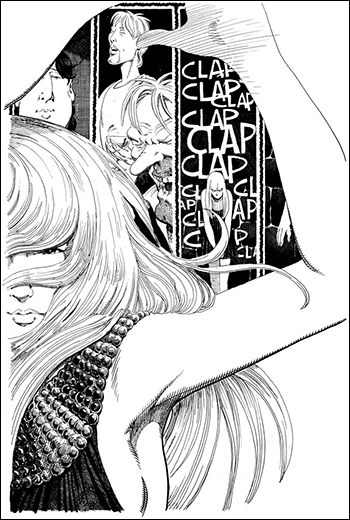 It’s difficult to find the words for how much I love this volume. I find it to be an achingly beautiful representation of the mundanity of long-term relationships. The rest of the story is at times humorous, tragic, and a little scary. We learn a lot about Jaka, though we’re not sure of the accuracy of Oscar’s reporting. How much of “Jaka’s Story” is the result of artistic license, or the dilution of Jaka’s stories told to Rick and relayed to Oscar? We don’t know, but one thing glaringly obvious. This is that Jaka must feel free, even at great cost. The parts of Oscar’s book that involve Jaka’s “nurse” do not correspond with what we know about the woman later in the volume, but in Jaka’s mind, the ever-presence of authority was clearly not well tolerated. This resulted in an injury while dancing in the playground as an attempt at a momentary sense of freedom, and also in Jaka’s disobedience in opening a forbidden door at her home in Palnu. If we weren’t aware of it before, we are now positive that Jaka views dance as the key to this freedom. This is a point driven excruciatingly home at the revelation of Jaka’s abortion, which was slightly foreshadowed in Church & State, when Jaka expressed her fears that having a baby would make her ugly. Being ugly, of course, would have been a detriment to her career, and therefore, not acceptable. Jaka chose freedom slightly thereafter, and here it costs her marriage. Now, whether Rick would have been more receptive to her fears if she had discussed them with him first is debatable. Rick mentions to Oscar earlier that if Jaka couldn’t dance anymore because of him, that she’d hate herself and he’d hate her. He notes that he’d “feel as if [our] love had destroyed something more important than either of [us]…” Would he have agreed that they shouldn’t have a child? Convinced her to have a child and resented her for it later, or convinced her NOT to have a child and resented her for it later?
It’s difficult to find the words for how much I love this volume. I find it to be an achingly beautiful representation of the mundanity of long-term relationships. The rest of the story is at times humorous, tragic, and a little scary. We learn a lot about Jaka, though we’re not sure of the accuracy of Oscar’s reporting. How much of “Jaka’s Story” is the result of artistic license, or the dilution of Jaka’s stories told to Rick and relayed to Oscar? We don’t know, but one thing glaringly obvious. This is that Jaka must feel free, even at great cost. The parts of Oscar’s book that involve Jaka’s “nurse” do not correspond with what we know about the woman later in the volume, but in Jaka’s mind, the ever-presence of authority was clearly not well tolerated. This resulted in an injury while dancing in the playground as an attempt at a momentary sense of freedom, and also in Jaka’s disobedience in opening a forbidden door at her home in Palnu. If we weren’t aware of it before, we are now positive that Jaka views dance as the key to this freedom. This is a point driven excruciatingly home at the revelation of Jaka’s abortion, which was slightly foreshadowed in Church & State, when Jaka expressed her fears that having a baby would make her ugly. Being ugly, of course, would have been a detriment to her career, and therefore, not acceptable. Jaka chose freedom slightly thereafter, and here it costs her marriage. Now, whether Rick would have been more receptive to her fears if she had discussed them with him first is debatable. Rick mentions to Oscar earlier that if Jaka couldn’t dance anymore because of him, that she’d hate herself and he’d hate her. He notes that he’d “feel as if [our] love had destroyed something more important than either of [us]…” Would he have agreed that they shouldn’t have a child? Convinced her to have a child and resented her for it later, or convinced her NOT to have a child and resented her for it later?
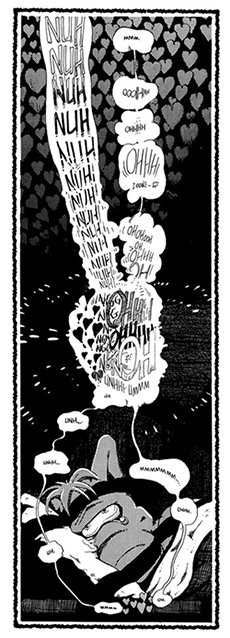 Dave’s pages of prose (written as Oscar) are simply stunning. Cleanly designed pages featuring a single column of text with a highly detailed drop cap next to a lovingly rendered image by Dave and Gerhard…who could complain? Well, I’m a designer, so I’m going to a little bit, just by mentioning that the full justification of the text is a little unruly, resulting in some lines with much more noticeable word spacing than others. Not a huge deal, but hard for my design-mind to ignore. Aside from that, it’s a great way to break up the paneled pages, which in this volume are mostly 3×2, 4×2, and 5×2. Not much interest in layout (though there are some choice pages), but that’s pretty much what’s called for in a story like this. It also makes the times when Dave does break the grid a little more powerful.
Dave’s pages of prose (written as Oscar) are simply stunning. Cleanly designed pages featuring a single column of text with a highly detailed drop cap next to a lovingly rendered image by Dave and Gerhard…who could complain? Well, I’m a designer, so I’m going to a little bit, just by mentioning that the full justification of the text is a little unruly, resulting in some lines with much more noticeable word spacing than others. Not a huge deal, but hard for my design-mind to ignore. Aside from that, it’s a great way to break up the paneled pages, which in this volume are mostly 3×2, 4×2, and 5×2. Not much interest in layout (though there are some choice pages), but that’s pretty much what’s called for in a story like this. It also makes the times when Dave does break the grid a little more powerful.
Dave has gotten a lot better at keeping his characters, especially women, on-model in this book as well. Nothing like drawing tons of Jaka to help you start drawing her really consistently, something that a female character like Astoria certainly hasn’t enjoyed up to this point. You can also see some Mort Drucker influence in the way Dave draws overall, especially in the chins. As for lettering, this book has one of my favorite examples of Dave’s creativity, as Cerebus is forced to listen to Jaka and Rick having sex on the other side of the wall. There’s some other fantastic examples throughout, and Dave’s ability to imply tone, volume, motion, and timing through hand-drawn type adds an atmosphere to Cerebus sorely lacking in many other comics, which seem comparatively flat and static. The character of Mrs. Thatcher is particularly expressive, foreshadowing how much more emphasis would be on lettering in the future. Gerhard’s work continues to improve, and he benefits from having fewer settings to worry about. This allowed him to further solidify his toning skills, giving great depth and life to Jaka’s Story. This adherence to a single setting would be further explored, to great success, with Melmoth.
Top Moments
Cerebus: “Listen. Kid. Cerebus is in love with your wife…”
Rick: “I know, she’s great, isn’t she?”
Jaka: “You do not, I rePEAT…do NOT ask a guest in my home to make APILLAROFFIRE!!
Rick: “I asked him IF he knew how!!! If! IF! IF!”
The look on Oscar’s face in the midst of his writer’s block
Oscar’s main altercation with Pud
Gerhard’s mind-blowing skill at drawing rain and mist
Jaka: “You bet your ASS, grampaw…”
Old man: “HOW’S THAT?!
Oscar [quietly]: “I said ‘they’re tainted with opium…'”
Old man: “Ye have ta SPEAK UP, SONNY!”
Oscar [louder]: “I said ‘they’re very good.'”
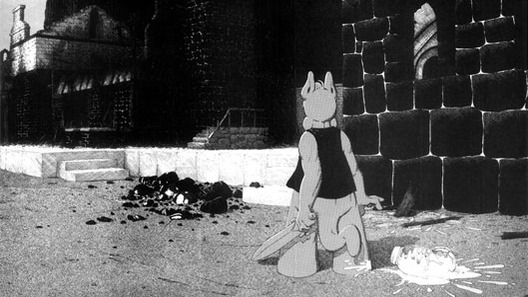

Recent Comments